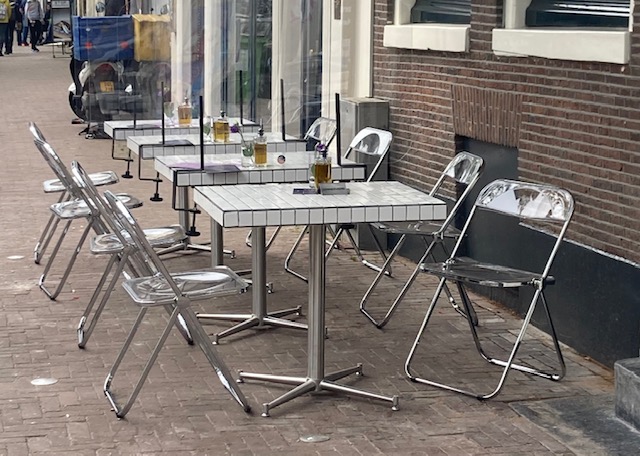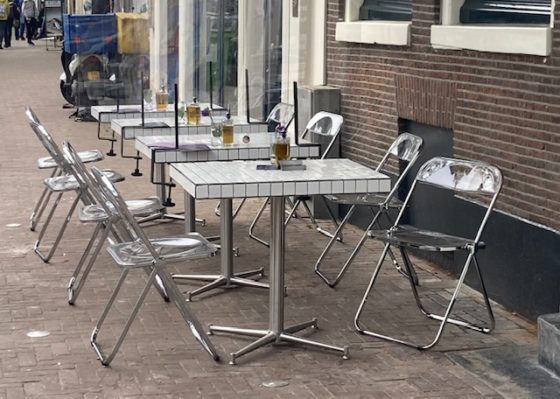Coronavirus in the Netherlands: what you need to know (May 29)


Fewer people are testing postive for coronavirus and more people are being vaccinated so that means switching from a ‘shut unless’ to an ‘open unless’ strategy, prime minister Mark Rutte told reporters on Friday evening. So here is a round-up of the next batch of changes to the coronavirus regulations.
Groups
You can now invite four people over the age of 13 to your home per day or go outdoors in a group of four people.
Working from home
Working from home remains key but teams will be able to meet again for training and development.
Museums, cinemas and theatres
Museums and historic buildings can admit one visitor per 10 square metres. Cinemas, pop music venues and theatres can also open their doors again, subject to certain conditions including reservation, health checks and designated seating. Reservations can be made for up to 4 people.
Large venues with 1,000 seats or more may admit up to 250 visitors as long as they keep 1.5 metre apart.
Art and culture
Orchestras can rehearse together again and social distancing is not essential if not possible. However, the number of people who can be in one space cannot exceed 50, excluding teaching staff. No audiences are allowed. The other rules for singing, acting, music and dance continue to apply.
Amusement parks, zoos
Indoor spaces at amusement parks and zoos, such as a reptile house may reopen. Casinos and other indoor amusements like laser gaming may reopen, with a maximum number of visitors of one person per 10 square metres or up to 50 people. Reservations, registration and a health check are mandatory. When indoors visitors must wear a face mask.
Saunas and spas
They may also reopen with a maximum of one person per 10 square metres or up to 50 people, again with reservations, registration and a health check.
Sports and fitness
Adults may once again take part in sports in groups of up to 50 people without having to keep 1.5 metres apart, if the sport in question requires people to be closer. That means yoga classes can restart.
Competitive matches for children aged 17 and under may take place again but without spectators. The over-18s may not yet play competitive matches, but matches between members of the same sports club are okay.
Changing rooms and showers can reopen as well as clubhouses. People must wear a face mask indoors, except during the sports activity itself.
Restaurants, cafés and bars
Restaurants and cafes can open from 6am to 10pm, as long as everyone is assigned a table and there are no more than 50 guests in each space – ie indoors and outdoors. A maximum of four people per table seated 1.5 metres apart, excluding the under 13s.
Restaurants and cafés can serve dinner in a maximum of two sittings per table per evening. No live entertainment or big screens showing sports – ie no European Championship football.
Alcohol sales and coffee shops (cannabis cafés)
Alcohol may now be sold from 6am to 10pm and cannabis cafes may open for take away up to 10pm.
Shops
Shops can now have one customer per 10 square metres, rather than per 25 square metres as at present. Night shops can also reopen.
Education
Secondary schools can open fully from May 31 and must be open from June 7. Pupils will no longer have to social distance from each other. Face masks, however, will remain compulsory in school buildings apart from during actual lessons.
No mention of higher education was made at the press conference. Currently most college and university classes are still taking place online.
Entry passes
The government has also decided to introduce coronavirus entry passes as part of step 3 of the reopening plan. This means restaurants, sports venues and theatres can admit more people than the regulation 50 if they only admit people who have a negative coronavirus test – as long as social distancing is observed.
A network of fast test locations is being put together and the tests will be free. It will be up to the venues themselves whether or not to opt for testing and more customers or fans.
Travel
The blanket ban on foreign travel has been replaced with travel advice on a country by country basis. Check which are yellow or green via Wijsopreis.nl (in Dutch only).
However, most countries – including those with a ‘yellow’ or ‘green’ risk level – have restrictions on travellers from the Netherlands in place, such as quarantine or a negative coronavirus test.
Non-essential travel to orange and red countries is still recommended against.
The rules for travel from abroad to the Netherlands remain unchanged, and visitors will have to go into quarantine if they travel to the Netherlands from a country not on the designated safe list outside the EU.
There are some exceptions to the travel ban for non-EU nationals, which are detailed here.
What is next?
The fourth step of the reopening schedule is now planned for 30 June. This stage involves expanding the entry pass system and will mean festivals, concerts and funfairs can take place again. Discotheques and nightclubs will also be able to reopen from June 30.
The government will decide on June 22 if the infection rate has come down enough to allow this to happen.
The last step, step 5, lifting the basic rules and removing the entry pass system, will be taken when the number of infections and hospital admissions allow, but this could also take place on June 30 if the infection rate is low enough, ministers said.
Thank you for donating to DutchNews.nl.
We could not provide the Dutch News service, and keep it free of charge, without the generous support of our readers. Your donations allow us to report on issues you tell us matter, and provide you with a summary of the most important Dutch news each day.
Make a donation